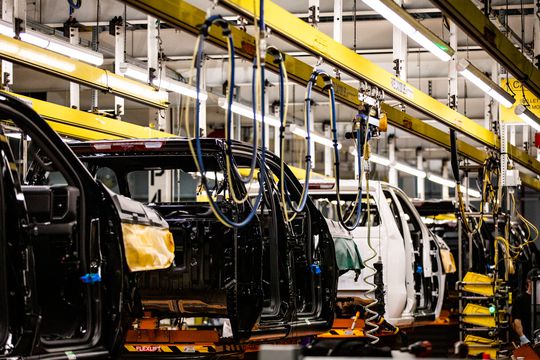Senators Slam Automakers Over Data Selling
A bipartisan group of U.S. senators has criticized major automakers for their “profit-driven” resistance to right-to-repair legislation while profiting from the sale of customer data. This growing scrutiny highlights concerns over consumer privacy and the monopolistic practices of the automotive industry.
In a strongly worded letter addressed to the CEOs of leading automakers, Senators Elizabeth Warren (D-MA), Jeff Merkley (D-OR), and Josh Hawley (R-MO) accused the industry of hypocrisy. They urged automakers to prioritize customer privacy and cease their opposition to right-to-repair laws, which aim to empower consumers to make independent decisions about their vehicles’ repairs.
The senators wrote:
“It is clear that the motivation behind automotive companies’ avoidance of complying with right-to-repair laws is not due to a concern for consumer security or privacy, but instead a hypocritical, profit-driven reaction.”
They argued that restrictive repair policies only serve to stifle competition and boost automakers’ revenues at the expense of consumer choice and fairness.
The Rise of Right-to-Repair in the Automotive Sector
The right-to-repair movement, which initially focused on consumer electronics like smartphones and laptops, has expanded to include vehicles. With cars increasingly resembling “computers on wheels,” automakers have developed advanced software systems that make it difficult for independent repair shops or car owners to service their vehicles without going through the manufacturers’ authorized networks.
Proponents of right-to-repair laws argue that such restrictions lead to higher repair costs and limit consumer freedom. At its core, the movement seeks to ensure that individuals and third-party repair shops have access to the tools, parts, and information needed to fix products without manufacturer interference.
Automakers and the Sale of Customer Data
Adding to the controversy, automakers have been collecting and monetizing vast amounts of data from their customers. Modern vehicles are equipped with sensors and software that track driving habits, including acceleration patterns, braking behavior, trip lengths, and locations.
Earlier this year, The New York Times revealed that General Motors was providing detailed information about its customers’ driving habits to insurance companies — often without the drivers’ consent. This practice has raised significant concerns about privacy violations and the ethical implications of using consumer data for profit.
The senators’ letter emphasized the disconnect between automakers’ claims of prioritizing consumer privacy and their data-selling practices. This double standard, they argue, undermines the industry’s credibility in opposing right-to-repair laws.
Right-to-Repair Legislation: Progress and Roadblocks
Several states have taken steps to address the issue through right-to-repair laws. These laws aim to ensure that car owners and independent repair shops have access to the necessary tools and software for repairs.
In 2020, Massachusetts voters overwhelmingly approved a ballot measure requiring automakers to share repair data with car owners and independent repair shops. However, automakers responded by filing lawsuits to block the law, arguing that it posed security risks. Four years later, the Massachusetts law remains inactive, tied up in legal challenges.
Automakers have frequently cited consumer security and privacy concerns as reasons for their resistance to these laws. However, advocates argue that such claims are largely unfounded and serve as a smokescreen for protecting their lucrative repair monopolies.
The senators’ critique highlights the broader implications of automakers’ practices on consumers. Restrictive repair policies not only lead to higher repair costs but also force car owners into a cycle of dependency on manufacturers.
Additionally, the sale of customer data raises serious privacy concerns. Many drivers are unaware of the extent to which their personal information is being collected and shared with third parties. Without stronger regulations, consumers risk losing control over both their vehicles and their data.
Advocates for right-to-repair laws argue that such legislation is essential to protect consumer rights and foster competition in the marketplace. By breaking the automakers’ stranglehold on repairs, these laws could lead to lower costs, greater transparency, and more equitable access to services.
The senators’ letter reflects a growing recognition of the need for federal action to address these issues. As Senator Warren and her colleagues pointed out, the automotive industry’s resistance to right-to-repair laws is not about safeguarding consumers but about preserving profits.
The automotive industry is at a crossroads, facing mounting pressure from lawmakers, consumers, and advocacy groups to reform its practices. While automakers have defended their policies as necessary for security and innovation, the increasing scrutiny on their data-selling practices and repair monopolies suggests that change may be inevitable.
For now, the future of right-to-repair laws remains uncertain, as legal battles continue to stall progress in states like Massachusetts. However, the senators’ bipartisan call to action represents a significant step toward ensuring that consumers have the freedom to repair their vehicles and protect their personal data.
The criticism from Senators Warren, Merkley, and Hawley underscores the urgent need for greater accountability in the automotive industry. Automakers’ opposition to right-to-repair laws, coupled with their data-selling practices, highlights a troubling prioritization of profits over consumer rights.
As the right-to-repair movement gains momentum, it is clear that consumers and lawmakers alike are demanding a more transparent and equitable approach from the industry. Whether automakers will rise to meet these demands remains to be seen, but the push for reform is unlikely to fade anytime soon.


Comments are closed.